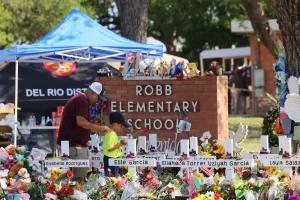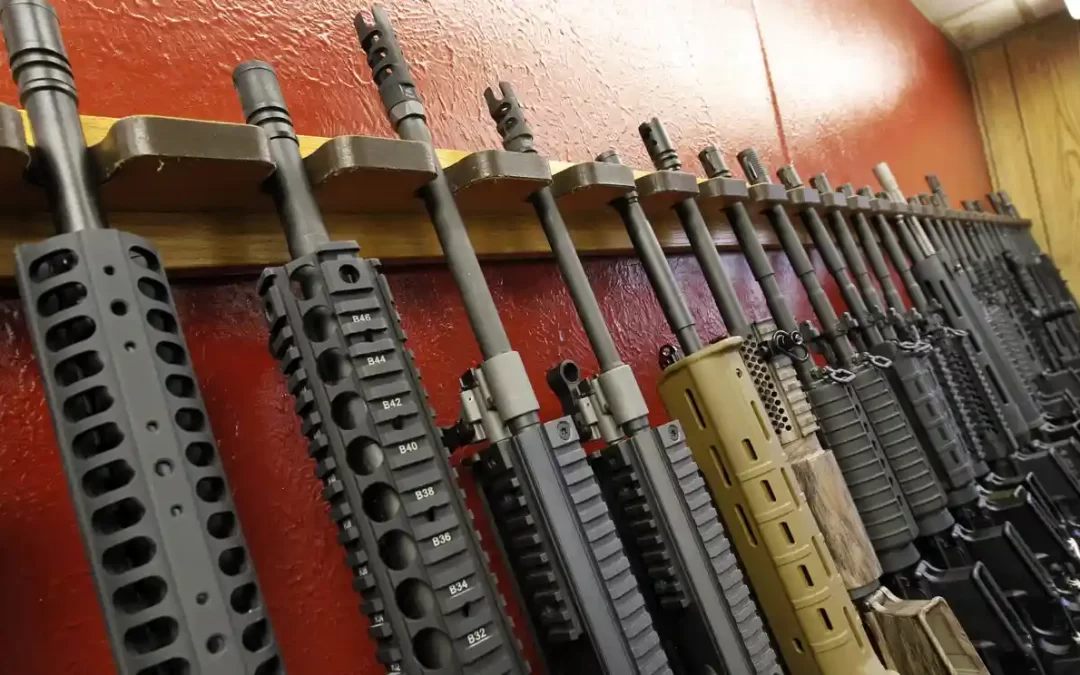, The fictional character of James Bond has a license to kill. He has been issued this license by his government. This license is not given to just anybody. Years of experience and exemplary performance made Bond eligible for this elite distinction in the secret service. And it is only issued in the secret service. In the USA today no license to own or use a gun, not even an assault rifle, is required.
In recent times we have heard the objections of those who feel that some regulations have trampled on their rights, their freedom to make choices for themselves. The gun control debate is a prime example.
“The idea that an 18-year-old kid can walk into a gun store and buy two assault weapons is just wrong.”
“What in God’s name do you need an assault weapon for except to kill someone?”
President Biden, May 24, 2022, following the school shooting in Uvalde, Texas

The gun lobby in the US insists that every adult has and should continue to have the right to own a gun, any kind of gun. But should we have total freedom of choice in all matters? Obviously not. We can’t have people going around stealing or destroying the property of others. Some rules or laws need to be in place to protect us from those that might act irresponsibly. So when is it appropriate to curtail an individual’s freedom? How much freedom is too much freedom? When, if ever, should we be prevented from making our own choices?
How we answer these questions depends largely on our worldview or mindset. In The Hopeful Mindset two fundamental mindsets are discussed, The Independent (Cynical) Mindset and The Interdependent (Hopeful) Mindset. Each of us has a worldview, a set of ideas about the nature of our existence and the nature of our world. The ideas that make up an individual’s worldviews are always based on a fundamental assumption about the relationship between an individual and that individual’s world. The assumption that underlies the worldview of a person with the independent mindset is that each of us exists independently. It is the mindset of the rugged individualist. Within this mindset the independence of the individual is not only esteemed but raised to the level of sacrosanct. In this mindset independent individuality is the highest ideal. All else is seen to be subordinate to the rights and freedoms of the individual. Where conflicts exist between the personal rights of one individual and another disputes are either settled in courts of law or by one individual exerting dominance over the other by force. Might makes right.
In the minds of individuals under the sway of the independent mindset individual rights and freedoms are sacred. An individual not only has the right to his or her opinions and beliefs but also has the right to attempt to make others abide by them, by force if necessary. The assumption is that those with the best ideas will win out in the end. It’s a sort of survival to the fittest ideas. However, this is a faulty interpretation of evolutionary theory. Evolutionary selection does not favour the mightiest or strongest among competing options. In actual fact it selects in favour of those options that are best adapted or adaptable to the prevalent circumstances. This important distinction highlights the shortcomings of the independent mindset and its assumption that independently existing phenomena are the way of the world.
In contrast to the independent mindset’s assumption of independent individuals is the interdependent mindset’s understanding of individuals as existing within interconnected webs of relationships. In this mindset it is natural for individuals to be concerned with their responsibility to contribute to the health of the whole in which they exist over their individual rights or freedoms. In this view an individual’s rights and freedoms exist only within a healthy and sustainable society.
These two worldviews have significant affects an individual’s opinions regarding gun control laws With the independent mindset’s assumption of separately existing selves living in a world of separately existing things and events the belief that individuals should be allowed to buy and own guns is seen as a necessary right. The assumption of separate existence supports the idea that individuals not only should have the right to own guns but also need to do so in order to protect themselves from other independent individuals or groups who may want to dominate them in some way, such groups include local, state, and national governments. The independent mindset gives rise to both the perceived problem (separate independent individuals who might want to harm them) and the perceived solution (guns for protection). Thinking that every individual should have the right to own guns is a natural outcome of this mindset because it sees the world as an everyone-for-themselves kind of place. If the price of individual freedoms is the massacre of dozens of innocent people every so often so be it. From this perspective is no price too great to pay to preserve the unrestricted freedoms of independent individuals.
To individuals who subscribe to the interdependent mindset the problem and solution look very different from those of independent mindset’s adherents. Those who understand the interdependent nature of their existence see the problems facing the world as consequences of a failure to respect the interdependent nature of reality. As such, the solution is to learn to see our interdependent nature and to act according to this understanding. For individuals of the interdependent mindset who recognize that we depend on each other and that our cooperative efforts to contribute to a sustainable world are essential to our survival, regulation of gun ownership makes good sense. Unrestricted access to weapons capable of the mass slaughter of dozens of innocent children by a single individual is understood to be counter to the best interests of society as a whole. A restriction in the area of individual freedoms is understood as necessary to a properly functioning society.
Much of the debate over gun control laws boils down to the fundamental mindsets of the individuals and groups engaged in the argument. Those who see themselves as independent individuals will argue for the right of each person to make his or her own choices, including whether or not to own a gun and to do so without governmental interference. The thinking is along the lines of, “I should be allowed to make my own choices even when they could have serious negative consequences.”. On the other hand, individuals and groups who see themselves as part of a complex web of interdependent systems emphasize the responsibilities of each individual to create and maintain the wellbeing of the greater whole upon which their individual lives depend. In this case the thinking is something like, “I am willing to have my freedom of choice regulated to a degree in order to live in a compassionate and sustainable society.”.
A question asked at the beginning of this article was, “When, if ever, should we be prevented from making our own choices?” People subscribing to the independent mindset would probably say “never” or “only in extreme cases like murder and blowing up buildings”. Conversely, those of an interdependent mindset would likely say, “Whenever there is a threat to the operation of a compassionate and sustainable society.” In the latter case regulation, when used for the protection and wellbeing of individuals and society, are seen as good and necessary. Individuals who hold with the independent mindset tend to see regulations as threats to their personal freedoms.
Sometimes overlooked in discussions like this one is the relationship between rights and responsibilities. Everyone has the right to own a car but not everyone has the right to drive a car. You must take driver training and acquire a driver’s license before you can get behind the wheel of a car and drive it out into traffic. Is this law an impingement on individual freedoms? Most people would say that this is a necessary regulation of freedom. Why? Because without it there would be a unacceptable increase in injuries and deaths caused by inexperienced drivers. We, as a society, have deemed it appropriate, in this case, to regulate who can drive and who can’t. The assumption here is that, without the existence of this regulation, a number of irresponsible people with little or no training would drive their cars on public roads with disastrous results.
So the answer to the question “When, if ever, should we be prevented from making our own choices?” is, whenever there is a significant chance that individuals will behave irresponsibly in ways that could cause serious harm to the wellbeing of other individuals or society in general. The point is that there can be no freedom without responsibility; where responsibility is understood to mean taking into account the rights and wellbeing of others when making a choice.
“In 2017 (in the US), some 39,773 died from gunshot injuries, an average of nearly 109 people each day. Per capita, this is significantly higher than in other industrialized countries. Firearm homicides in the USA disproportionately impact communities of colour and particularly young black men.” (Amnesty International https://www.amnesty.org/en/what-we-do/arms-control/gun-violence/)
If driving a vehicle is a case where there is a significant chance that individuals will behave irresponsibly in ways that could cause serious harm to other individuals then surely the ownership and use of firearms is also and should, therefore, be regulated to safeguard the general public.
Living responsibly is a natural outcome of fully comprehending the interdependent nature of existence. A deep understanding of this fact significantly reduces the chances of an individual behaving irresponsibly because he or she sees that the consequence of his or her actions are widely felt. If everyone had this understanding and lived accordingly gun regulation would not be necessary and many other regulations would become redundant. Unfortunately, this is not the case and nor it likely to be the case anytime soon. If the ultimate solution to the problem is not achievable in the near future are we doomed to simply stand by and hope that things will work out? Fortunately not.
In light of the reality of divided mindsets and the consequent and seemingly irreconcilably division on the question of gun control in the general public the most realistic hope for an end to gun violence lies with those that have been elected to legislate. It is imperative that lawmakers institute the regulations required to protect its citizens from the harmful acts of irresponsible and mentally ill gun owners. Hope lies in the fact that the government of a democratic republic has the means to deal with gun violence if there is the political will to do so among its members.
Concerned citizens also have an important roll to play in urging politicians to do what needs to be done. Likewise they need to put their support firmly behind those in government (and candidates running for election) willing to take the needed actions even in the face of strong opposition from other politicians and the well organized groups opposed to gun legislation.
“27 school shootings have taken place so far this year.” NPR https://www.npr.org/2022/05/24/1101050970/2022-school-shootings-so-far Updated May 25, 202212:52 AM ET
There will be a 28th school shooting unless effective gun control legislation is enacted soon.

